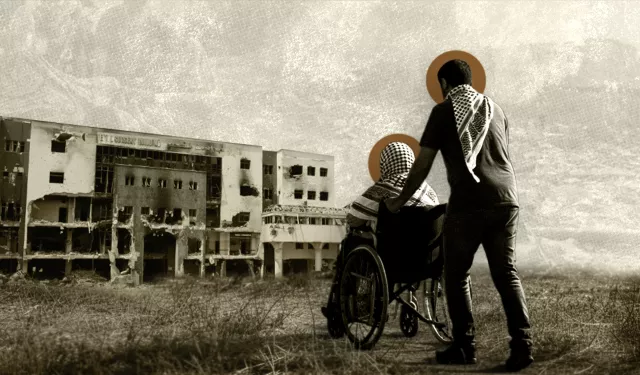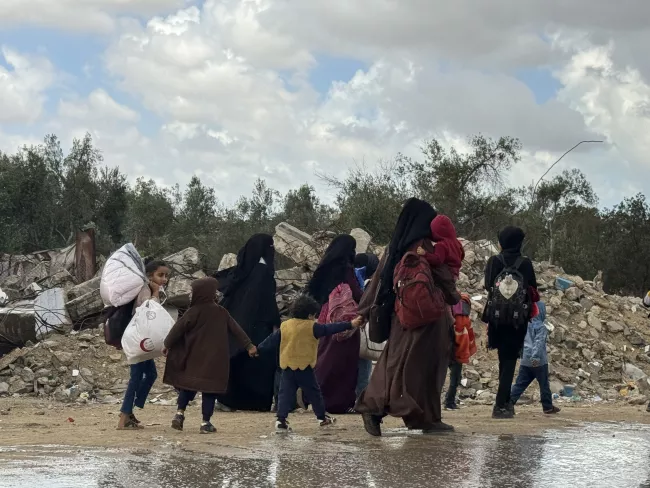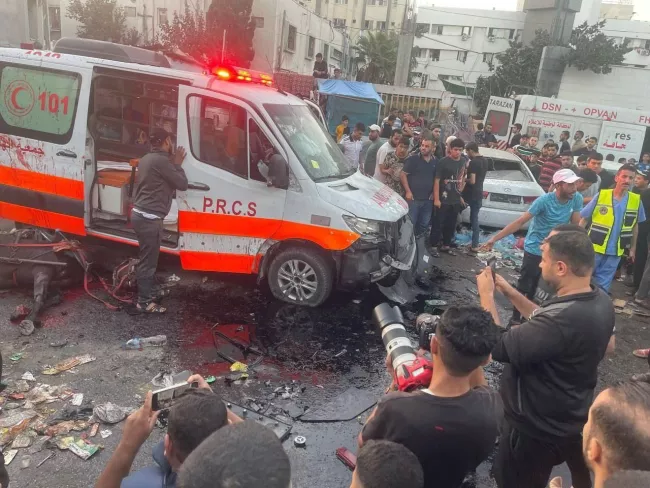
Gaza Journalist Diaries| My mother’s quiet exodus in a wheelchair
I was at a loss. What should I write?
My colleagues at Al Manassa asked me to write commemorating the second anniversary of Israel’s genocidal war. But what is there to write from a homeland turned into a pile of rubble, whose every stone and tree awaits rebirth. And how does one rebuild humanity where it has been destroyed?
The killing and devastation continue. Entire generations have lost their future after losing their homes and families, after being deprived of their education, and after watching their hopes and ambitions collapse.
Then my mother, Wisam, came to mind. Born in Gaza 64 years ago, she is a mother of five and grandmother of six. She lives on three kidney dialysis sessions each week. Since the hospitals were destroyed and the health sector collapsed, her sessions have been cut in number and shortened in time. She has suffered the consequences.
Repeated displacement
On Sept. 24, I traveled from Deir Al-Balah in central Gaza, where my wife and I have been displaced for two years, to Gaza City in the north, where my family had returned last February after a long displacement. During that ordeal, they moved from one place to another, from tent to tent, always trying to settle near a hospital that could provide the dialysis my mother has needed for more than eight years.
I went to persuade them to flee again to protect my mother’s life, fearing what the Israeli army was preparing: a wide ground operation aimed at the city, its people and its stones alike.
On the way I kept thinking what argument could convince them to leave, to protect them from a monster that does not see us as human beings worthy of life?
I made the journey. After long conversations and arguments, my father and my brother refused to leave, preferring to stay in Gaza City rather than safeguard their lives. My mother agreed with my brother and sister to evacuate to Al-Zawaida, near the British field hospital, where she had received dialysis during the previous displacement.
Back then, she received only two sessions out of the three she needs, and each session was cut to two hours instead of the usual four.
Two years ago, the occupation government launched an unprecedented war on Gaza with the intent to destroy the strip’s cities, camps and towns, as well as pursuing members of the Palestinian resistance and ending Hamas’ rule. This came after its military wing stormed Israeli settlements east and north of Gaza, capturing more than 200 settlers and soldiers and taking them to Gaza on Oct. 7, 2023.
One week later, after frenzied bombardment that killed hundreds of civilians, including many children, women, and elderly, and leveled residential towers, buildings and infrastructure, the occupation ordered the 1.2 million residents of the northern strip to evacuate their homes and head south.
At the time, I was caught up covering events. Meanwhile, my mother would leave our home in the Al-Rimal neighborhood downtown with one of my brothers for her dialysis sessions at Al-Shifa Hospital to the west—a place that had turned into a sea of displaced, dead, and wounded people.
I started seeing my mother at the hospital, not at home. We reassured each other mostly with glances and only a few words, knowing all along that we were under threat, we could die any minute either from the bombs or the collapse of health services.
As the assault intensified, and as I became certain the days ahead would spare no one—young or old, man or woman, a fighter or someone in a wheelchair—I forced my family to move towards the center of the strip. I took them to Nuseirat refugee camp. My first concern was making sure my mother had access to her sessions, that her condition would not deteriorate, that we would not, God forbid, lose her.
Between illness and displacement
More than four kilometers separated my mother’s place of displacement from Al-Aqsa Martyrs Hospital in Deir Al-Balah. Cars were rarely available, so donkey carts took their place.
But my mother, who suffers from several chronic illnesses, including heart disease, hypertension and severe osteoarthritis, could not bear riding a wooden cart, as she told me over the phone. The best option for her health, but the most difficult, was going to the hospital in a wheelchair with one of my brothers pushing her for every single session.
This went on for about three months, until they were forced to move again, this time to Rafah in the south. I was displaced there too, and, miraculously, I managed to secure a car to take her to Youssef Al-Najjar Hospital for her sessions, which were at dawn, because of the large number of patients and the limited number of machines.
My mother had to set out five hours early to make sure she got a turn, then dialysis for two hours, and then wait another three to four hours sitting in her wheelchair until morning, when the driver could finally get going and bring them back to the tent.
Moving at night was impossible. The intensity of bombardment and killing restricted any travel by vehicle once it got late. Cars might be targeted by Israeli missiles on the pretext that they posed a threat to soldiers operating inside the strip, or for any other reason the occupation army might decide without oversight or accountability.
I made sure my work kept me near the hospital so I could see her when she goes for her sessions. I remember one time she said, “My body is wrecked, son, from sleeping on the wheelchair and the lack of medicine. I feel as if I’m alive but not alive.”
Every time we met, she chose to speak about her fellow dialysis patients “So-and-so died today. So-and-so didn’t come. I called her and she said that she couldn’t find transport.” Then she would add, “I’m giving you all such a hard time. Please forgive me.”
I don’t know what we are supposed to forgive her for, when it is the occupation that created such catastrophic conditions that have trapped her and every patient with a chronic illness.
Because of the expansion of military operations and the constant evacuation orders, I had to move my family once more—under fire in May 2024—from Rafah to Al-Zawaida, west of the central strip, near the British field hospital.
The distance between their shelter and the dialysis site shrank to no more than two hundred meters, but the road was a rough, sandy track. Whoever accompanied her had to exert great physical effort pushing or pulling her wheelchair there and back. All this at a time when we were already starving, after the occupation blocked the entry of basic food supplies.
Suffering in common
Under these conditions patients could no longer reach hospitals, and their numbers fell day after day. Of the 1,200 people receiving dialysis in Gaza, 472 died during the genocidal war because services were cut back or disappeared altogether.
Israel also destroyed 78 dialysis machines out of 140 across Gaza’s hospitals during the strikes on health facilities, according to the Palestinian Center for Human Rights in a report published on May 20.
Signs of decline began to show on my mother; not from the physical toll of the dialysis, but from fear of the unknown and the hardship of living in a tent that bakes in summer and freezes in winter.
True, she does not complain much or confide what she carries inside. But her sallow face, the disappearance of her smile, and her sunken eyes tell the story of a suppressed fear for the five children she raised until each built a family and a life.
For two years I have watched her body and voice change, watched her forget and repeat the same stories as if telling me for the first time. I speak to her as much as I can, in person or by phone. Each time she tells me about the dialysis patients, how most of them now use wheelchairs, not because of aging, but because they receive fewer sessions than the bare minimum.
A few days ago, I told her that we have to move again, and that our family would have to split up between two different places. She refused. But fear forced her to yield to her children. “Do whatever you think is best,” she said. “I just don't want to be a burden or a distraction.” That was her answer before the family split and my mother was forced to flee for the fifth time in two years under Israel’s genocide.


